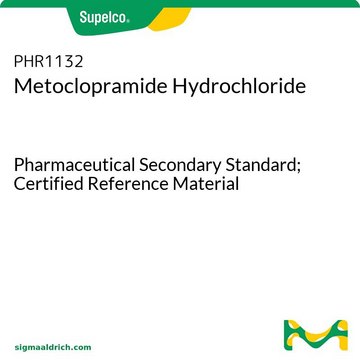PHR1558
Pyridine
Pharmaceutical Secondary Standard; Certified Reference Material
Synonyme(s) :
Pyridine
About This Item
Produits recommandés
Qualité
certified reference material
pharmaceutical secondary standard
Niveau de qualité
Agence
traceable to USP 1601747
Densité de vapeur
2.72 (vs air)
Pression de vapeur
10 mmHg ( 13.2 °C)
20 mmHg ( 25 °C)
CofA (certificat d'analyse)
current certificate can be downloaded
Température d'inflammation spontanée
899 °F
Limite d'explosivité
12.4 %
Conditionnement
ampule of 3x1.2 mL each
Technique(s)
HPLC: suitable
gas chromatography (GC): suitable
Indice de réfraction
n20/D 1.509 (lit.)
Point d'ébullition
115 °C (lit.)
Pf
−42 °C (lit.)
Densité
0.978 g/mL at 25 °C (lit.)
Application(s)
pharmaceutical (small molecule)
Format
neat
Température de stockage
2-30°C
Chaîne SMILES
C1=CN=CC=C1
InChI
1S/C5H5N/c1-2-4-6-5-3-1/h1-5H
Clé InChI
JUJWROOIHBZHMG-UHFFFAOYSA-N
Vous recherchez des produits similaires ? Visite Guide de comparaison des produits
Description générale
Application
Remarque sur l'analyse
Autres remarques
Note de bas de page
Mention d'avertissement
Danger
Mentions de danger
Classification des risques
Acute Tox. 4 Dermal - Acute Tox. 4 Inhalation - Acute Tox. 4 Oral - Eye Irrit. 2 - Flam. Liq. 2 - Skin Irrit. 2
Code de la classe de stockage
3 - Flammable liquids
Classe de danger pour l'eau (WGK)
WGK 2
Point d'éclair (°F)
68.0 °F - closed cup
Point d'éclair (°C)
20 °C - closed cup
Faites votre choix parmi les versions les plus récentes :
Déjà en possession de ce produit ?
Retrouvez la documentation relative aux produits que vous avez récemment achetés dans la Bibliothèque de documents.
Les clients ont également consulté
Protocoles
GC Analysis of Class 2 Residual Solvents on OVI-G43
-Cymene; 2,5-Dimethylpyrrole; Acetoin, ≥96%, FCC, FG; 2,5-Dimethylpyrazine; 2,6-Dimethylpyrazine; 2-Ethylpyrazine, ≥98%, FG; 2,3-Dimethylpyrazine; 4-Heptanone; 3-Ethylpyridine; 2,3,5-Trimethylpyrazine; Furfural; Pyrrole; Furfuryl acetate; Linalool; Linalyl acetate; 5-Methylfurfural; γ-Butyrolactone; 2-Acetyl-1-methylpyrrole; Furfuryl alcohol; 2-Acetylpyrrole; Pyrrole-2-carboxaldehyde
US EPA Method 8270 (Appendix IX): GC Analysis of Semivolatiles on Equity®-5 (30 m x 0.25 mm I.D., 0.50 μm)
Notre équipe de scientifiques dispose d'une expérience dans tous les secteurs de la recherche, notamment en sciences de la vie, science des matériaux, synthèse chimique, chromatographie, analyse et dans de nombreux autres domaines..
Contacter notre Service technique










